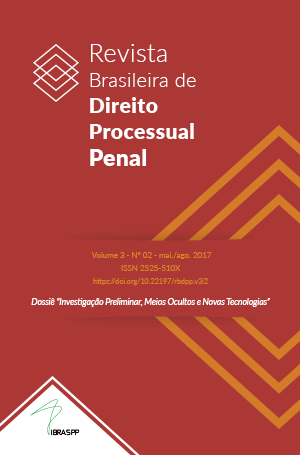The genesis of the “giusto processo” constitutional reform in Italy
DOI:
https://doi.org/10.22197/rbdpp.v3i2.61Keywords:
Giusto processo, evidence, declarative evidence, accusatorial system, confrontation, constitutional court, constitution, Italian criminal procedure.Abstract
This paper analyzes the complicated scenario that, starting with the promulgation of the current Italian criminal procedure code, in 1999 resulted in the constitutional reform of the "giusto processo". Inspired by an accusatory logic, the 1988 Code had introduced the contradictory "golden rule" in the formation of evidence, establishing the irrelevance of declarations secretly collected by the preliminary investigation actors. Unhappily received by the majority of the judiciary, the accusatory principles were suppressed in 1992 by the "inquisitorial revolution" caused by three constitutional court decisions (No. 24, 254, 255). Assuming that the contradictory in evidence production violates the search for the truth, the Constitutional Court has demolished the "golden rule," attributing probative value to all (or almost) statements unilaterally collected in the preliminary investigation by the prosecutor or the police. In fact, the mistake of the Constitutional Court was not figuring that the function of the criminal process is the revelation of the truth, which must be sought by any process that aspire the confidence of the citizens. The mistake was actually considering the contradictory as an obstacle to the pursuit of truth, causing an unfortunate opposition between two values that should be closely related. Essential to the cognitive function of the process is, in fact, the contradictory, the method which, as science clarifies, consists in subjecting the hypotheses to be proved to the most severe attempts of confrontation and falsification; while, on the other hand, it seems entirely reasonable to distrust what has been formed in secrecy, and especially the declarations that inevitably take preference to influence those who, in a position of authority, have unilaterally collected them. A reticent and partial attempt to recover the contradictory was later operated by Law 267 of 1997, which denied the probative value of previous statements on the responsibility of other co-defendants who afterwards exercised their right to silence. The law, however, even by reason of its objective inconsistencies, has been declared illegitimate once more by the Constitutional Court, with sentence 361 of 1998. But this time, together with the Union of Criminal Chambers, also appear the political forces, wounded by the censorship of a law that had been adopted almost unanimously shortly before. After that, promptly was approved the constitutional reform of the "giusto processo" (Constitutional Law No. 2 of November 23, 1999), which affirms that "criminal proceedings are regulated by the contradictory principle in the production of evidence (Article 111, paragraph 4, Const).Downloads
References
CHIAVARIO, La Bicamerale chiude il capitolo giustizia: ora bisogna operare con spirito costruttivo, em Guida al diritto, 1997.
CHIAVARIO, Dichiarazioni a carico e contraddittorio tra l’intervento della Consulta e i progetti di riforma costituzionale, em Legislazione Penale, 1998.
CORDERO, Franco. Ideologie del processo penale, Milano, 1966.
CORDERO, Franco. Procedura penale, Milano, 1966.
DAMAŠKA, I volti della giustizia e del potere. Analisi comparatistica del processo [1986], trad. it., prefacio de M. Taruffo, Bologna, 1991.
DI CHIARA, Processo penale e giurisprudenza costituzionale. Itinerari, Roma, 1996.
FERRUA, Studi sul processo penale, II, Anamorfosi del processo accusatorio, Torino, 1992.
FERRUA, Garanzie del giusto processo e riforma costituzionale, em Critica dir., 1998.
GEMMA; PELLATI, Processo e verità: un’altra decisione sostanzialmente coerente della Corte, em Giurisprudenza costituzionale, 1998.
GIOSTRA, Equivoci sulla testimonianza indiretta della polizia giudiziaria e sacrificio del principio di oralità, em Giurisprudenza costituzionale, 1992.
GREVI, Sull’applicabilità del nuovo articolo 513 c.p.p. nei processi in corso, em Diritto penale e processo, 1997.
GREVI, Garanzie soggettive e garanzie oggettive nel processo penale secondo il progetto di revisione costituzionale, em Rivista italiana di diritto e procedura penale, 1998.
KUHN, La struttura delle rivoluzioni scientifiche [1962], Torino, 2009.
MADDALENA, I termini di un impegno, em Magistratura indipendente, 1992.
MADDALENA, em Il giudice per le indagini preliminari dopo cinque anni di sperimentazione, Associazione tra gli studiosi del processo penale, Atti del convegno presso l’Università di Bari – Mattinata, 23-25 settembre 1994, Milano, 1996.
MARZADURI, Una sentenza additiva molto discussa, b) il diritto al silenzio del coimputato, em Diritto penale e processo, 1998.
PEPINO, Legalità e diritti di cittadinanza nella democrazia maggioritaria, Relazione al X Congresso nazionale di Magistratura democratica, Chianciano 29 ottobre/1° novembre 1993, em Questione giustizia, 1993.
PEPINO, La posta in gioco e un primo sguardo d’insieme, em Questione giustizia (fascicolo speciale: Giustizia e Bicamerale), 1997.
PERONI, La testimonianza indiretta della polizia giudiziaria al vaglio della Corte costituzionale, em Rivista italiana di diritto e procedura penale, 1992.
SCAPARONE, Diritto al silenzio e diritto al controesame del coimputato, em Giurisprudenza costituzionale, 1998.
SIRACUSANO, Vecchi schemi e nuovi modelli per l’attuazione di un processo di parti, em Legislazione penale, 1989.
TONINI, Una sentenza additiva molto discussa, a) il diritto a confrontarsi con l’accusatore, em Diritto penale e processo, 1998.
UBERTIS, Le riforme costituzionali proposte dalla Commissione bicamerale, c) la previsione del giusto processo, em Diritto penale e processo, 1998.
VENTURA, Escussione della prova e contraddittorio, em Giurisprudenza costituzionale, 1998.
ZANON, La Corte, il legislatore ordinario e quello di revisione, ovvero del diritto all’«ultima parola» al cospetto delle decisioni d’incostituzionalità, em Giurisprudenza costituzionale, 1998.
Downloads
Published
Issue
Section
License
![]()
As of 2022, articles published in the RDPP are licensed under Creative Commons Atribuição 4.0 Internacional. rticles published until 2021 adopted the Creative Commons Atribuição-NãoComercial 4.0 Internacional.
















